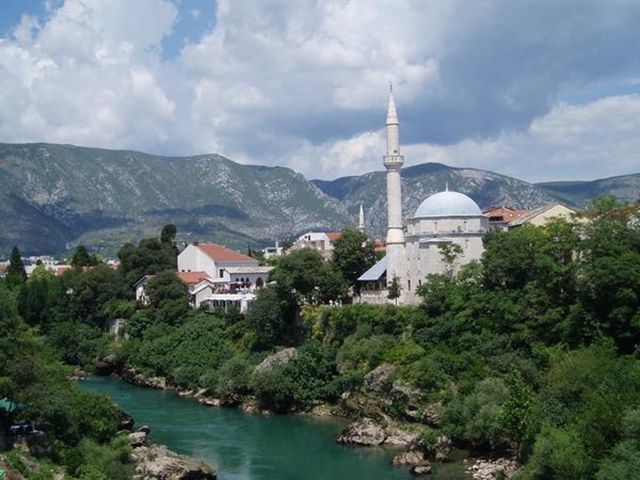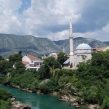
Wahhabist Militancy in Bosnia Profits from Local and International Inaction
Publication: Terrorism Monitor Volume: 9 Issue: 42
By:

Though the United States once took the lead in international efforts to save the Muslims of Bosnia during the bitter conflict that struck that nation in the 1990s, it is now under attack by the Salafist/Wahhabist community that began to flourish there after foreign jihadists were allowed to settle in Bosnia after the conflict. The current Wahhabist perception of America has even found its way into song:
America and other adversaries should know
that now the Muslims
are one like the Taliban
listen, brothers,
believers of the world
with dynamite on their chest
lead the path to dzennet (heaven)
The above lyrics were written by Bilal Bosnic, a Wahhabi community leader from the city of Bihac in Bosnia and Herzegovina (BiH) (radiosarajevo.ba, November 4). [1] Bosnic sings it at weddings and other kinds of social gatherings. How, then, did America become the enemy of radical Islam in the Balkans after undertaking two military interventions aimed at protecting Muslim civilians (Bosnia in 1994 and Kosovo in 1999)?
Many claim that Islamic extremism established itself among Bosnian Muslims thanks to the “inaction” of the West when the 1991 UN arms embargo left Muslims defenseless and when the West failed to secure UN protection zones in Srebrenica, Zepa and Gorazde during the war. The failure to protect these zones led to what some termed the first post-WWII genocide in Europe. This “inaction” gives a partial explanation but not a complete one. There is another “inaction” of local origin that contributed much more to the growing influence of Islamic extremists in Bosnia and Herzegovina.
There are countless examples of local authorities in Bosnia failing to act properly against Islamic extremism. The majority of these criminal cases have not been resolved and when the terrorists are identified the trials take years. There are some claims that “inaction” in Bosnia had its roots nearly 20 years ago when Bosnian authorities granted 50 passports to foreign mujahideen, most of whom were Salafist/Wahhabis (Oslobodjenje [Sarajevo], November 3). This “inaction” is not related to the police or court capacity or poor equipment, but rather to the ethnically divided BiH police and judiciary that has political sponsorship.
Islamic community leaders and local politicians described terrorism acts in BiH as isolated “criminal acts” and not a consequence of growing Islamic extremism. Attempts to initiate police investigations of the Wahhabi movement were often defined as Islamophobic. The head of Bosnia’s Islamic community, Reis Mustafa Efendija Ceric, has adopted a controversial approach to the Wahhabi community in Bosnia, defending their right to pursue their own interpretation of Islam: “Understanding faith differently is everybody’s right. We can or cannot agree with them but we have no right to prosecute anybody as long as they do not violate the law” (Daily.tportal.hr [Zagreb], September 8, 2010).
Responding in 2009 to remarks by a Croatian Cardinal regarding the difference between the moderate traditional form of Bosnian Islam and the “newly imported Wahhabi mentality,”
Ceric told a gathering of Bosnian Muslims:
“You are old Bosnian Muslims, whom they call desirable, and for whom they say they are sorry, because there are not more of you and because they dislike the new Muslims, whom they call Wahhabi… It is unacceptable and malicious to spread fear about new Bosnian Muslims… Bosnian Muslims, the old ones, were killed because they were weak, and the new ones, who are ready to protect their honor and freedom, have never, and will never, endanger anyone’s right to life, religion, freedom, property, and honor" [2]
After a Serbian Muslim with ties to the Wahhabist community opened fire on the U.S. Embassy in Sarajevo on October 28, Ceric condemned “violence and terror on behalf of Islam,” adding that terrorism “manipulates” Islam and “discredits” it (Sarjevo-x.com, November 6). Similar expressions were heard from many local politicians.
However, Ceric and others are forgetting their responsibility for increasingly imposing Islamic practices on all citizens of the country that lasts for years. They have not been commenting on why they tolerate the implementation of a parallel legal system (Shari’a) in Gornja Maoca, a village dominated by Wahhabi Bosniaks and site of a major counterterrorism operation in February 2010 (Reuters, February 2, 2010). They do not talk about why they took little action after previous terrorist attacks. According to Sadik Ahmetovic, head of the Bosnian Security Agency: “After the Bugojno attack [on a police station in June, 2010], we proposed several measures, but half of them were refused by parliament and condemned by the Islamic community of Bosnia” (RFE/RL Balkan Service, October 28).
The inaction of the international community and local leadership in dealing with militant Islam in BiH goes perfectly well with two opposing “actions” that fuel Islam radicalism in BiH. The first is the aggressive behavior and rhetoric of the Bosnian Serbs. Their leader, Republika Srpska president Milorad Dodik, said in October that:
The struggle of the Bosniaks for their national identity is completely tied to the idea of creating some kind of Bosnia-Herzegovina. The Bosniaks are a people that exist only in Bosnia-Herzegovina and only declared themselves a people sometime around 1993. They are stubbornly trying to prove their national identity, which they can only do by destroying the nationality of others — primarily, of the other constituent ethnic groups of Bosnia (RFE/RL, October 14).
Other examples can be found in alarming assessments of the Islamist threat to Bosnia’s Serbs that appear in the local media. A daily based in the Republika Srpska capital of Banjaluka recently claimed that Wahhabis now constituted 5% of the FBiH population (far in excess of figures out of Sarajevo) and had concentrated in 17 mostly rural municipalities along the border (the “Inter-Entity Line”) with the Republika Srpska (Nezavisne Novine [Banjaluka], November 1).
The second aggressive “action” is the “aid” that comes from the Arab world. At the beginning of the war this aid took the form of arms, while later on it consisted of money that supported building mosques and madrassas. On June 23, 2000, the author asked the war-time President of Bosnia and Herzegovina, Mr. Alija Izetbegovic, why he did not use money the country had received from Saudi Arabia for building factories, creating jobs etc., to which he replied: “They would never give me money for factories!” [3] Today, it is widely believed in Bosnia that certain Arab states provide financial aid to Wahhabis and their families.
Tensions between the various BiH communities have been reinforced by a segregated education system that keeps the Bosnian youth divided along ethnic and religious lines. Additionally, the local media perpetuates these divisions, fracturing the fabric of Bosnia’s multiethnic society. According to a Mostar daily, terrorism has created new splits in Bosnia-Herzegovina along ethnic lines: “In Republic Srpska [the ethnic-Serb majority republic that is one of the two main political entities that forms Bosnia-Herzegovina] the danger of radical Islam is overestimated and Muslim leaders underestimate it by saying that terrorism does not belong to any specific religion or ethnic group” (Dnevni List [Mostar], November 11).
There are a minimum of 3,000 Wahhabis in Bosnia-Herzegovina according to security studies, and many more that sympathize with them. They are not of significant numbers but they pose a significant threat. Their influence is growing not only in Bosnia but also in the Sandzak area of Serbia, where Bosniaks are in the majority.
This is the Balkan version of an approaching perfect storm. An Atlantic Initiative report argues that Bosnia needs "credible deterrence." This would "not only prevent a return to violent conflict, but would create the potential for forward movement….. Restored, credible deterrence is the sine qua non of any political and social progress in Bosnia and Herzegovina." [4] However, "credible deterrence" can only be imposed by the international community, the same international community that joins the overall “inaction” when it “agrees to disagree.”
When terrorist Mevlid Jasarevic failed to kill any Americans during the October 28 attack on the U.S. Embassy in the Bosnian capital, Sarajevans joked: “He did not pass the al-Qaeda entry exam!” Just how much truth there is in this joke will depend on how much “inaction” will be replaced by “action” from local authorities and the international community.
Nenad Pejic is the Prague-based Associate Director of Broadcasting for RFE/RL.
Notes:
1. Bosnia and Herzegovina (BiH) consists of the Federation of Bosnia and Herzegovina (FBiH – majority Muslim), the Republika Srpska (RS – majority Serbian Orthodox Christian) and the Brčko District, a tiny self-governing administrative unit.
2. Translation provided by a U.S. Embassy cable. Wikileaks: U.S. Embassy Sarajevo Cable, February 24, 2009; released September 1, 2011, https://www.cablegatesearch.net/cable.php?id=09SARAJEVO226 .
3. Author’s interview with Alija Izetbegovic, Sarajevo, June 23, 2000.
4. “A Security Risk Analysis – Assessing the Potential for Renewed Ethnic Violence in Bosnia and Herzegovina,” Atlantic Initiative and Democratization Policy Council, October 2011, https://www.atlanticinitiative.org/index.php?option=com_content&view=article&id=386%3Aa-security-risk-analysis–assessing-the-potential-for-renewed-ethnic-violence-in-bosnia-and-herzegovina&catid=42%3Arokstories&lang=en





